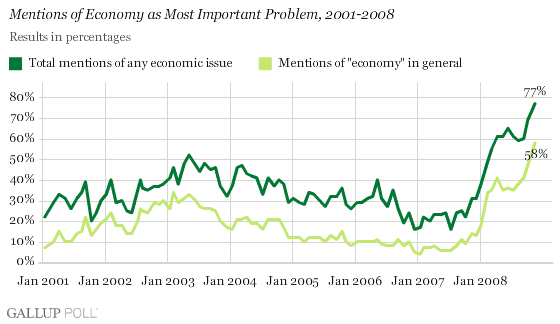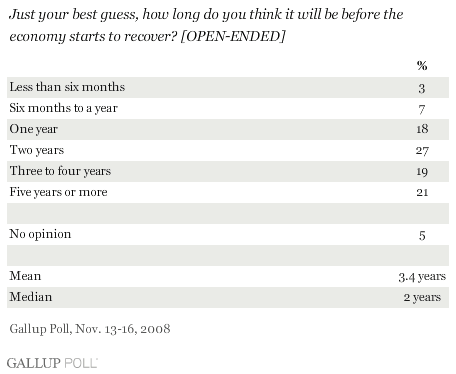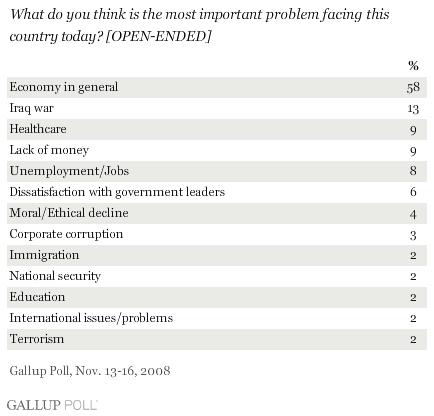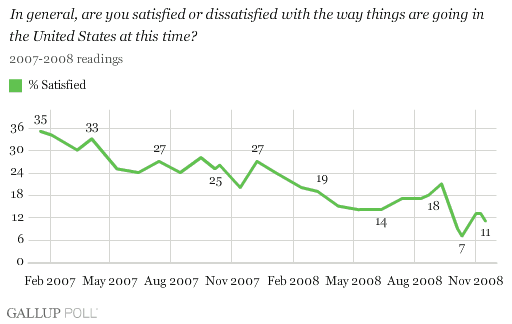PRINCETON, NJ -- Fifty-eight percent of Americans mention "the economy" in general terms when asked to name the most important problem facing the country. An additional 19% mention more specific economic issues such as unemployment or inflation as the nation's top concern, bringing the total mentioning some aspect of the economy to 77%. Both are by far the highest Gallup has measured since it began tracking this question monthly in 2001.

These results are based on the Nov. 13-16 Gallup Poll. Gallup began asking this open-ended "most important problem" question in 1939, and the percentage mentioning economic woes in the latest poll rivals some of the highest historical readings. Other times when economic concerns were similarly widespread include October 1945 (77% cited unemployment as the top problem), October 1974 (79% named inflation), October 1978 (83% cited inflation), and March 1980 (75% named inflation).
President-elect Barack Obama has stated that the economy will be his chief focus when he takes office next January. His priorities are certainly not misplaced, and he may benefit to some degree from public expectations that the economy will struggle for some time.
The poll asked Americans to estimate how long it will be before the economy starts to recover. Only 28% expect it to get better within the next year. Twenty-seven percent believe that economic improvement will not be seen for at least two years. And 40% expect it will be three years or more, including 21% who do not expect it to improve until after Obama's first term in office.

Iraq Fades as Most Important Problem
The problems in the U.S. economy -- coupled with improving conditions for the United States in Iraq -- have helped Iraq recede as the top problem in Americans' minds. Whereas Iraq was cited as the most important problem each month from April 2004 through January 2008, it now ranks a very distant second to the economy, with just 13% of Americans mentioning it. Other specific issues that are commonly mentioned this month include a "lack of money" (9%), healthcare (9%), unemployment (8%), and dissatisfaction with government leaders (6%).

Satisfaction Remains Low
Obama's election victory was clearly aided by frustration with the way things are going in the country, and voters searched for a new direction while taking out their frustrations on the Republican Party. Now Obama is tasked with trying to turn things around, in much the same way Jimmy Carter, Ronald Reagan, and Bill Clinton were when they took office.
The poll finds only 11% of Americans saying they are satisfied with the way things are going in the country, one of the lowest ratings Gallup has measured since 1979. The lowest reading Gallup ever recorded came last month, when an Oct. 10-12 USA Today/Gallup poll found just 7% satisfied.

Americans' assessments of the state of the nation may not turn around that quickly, either. When Reagan and Clinton took office, satisfaction ratings improved slightly, but remained at depressed levels throughout much of their first terms in office. It wasn't until their re-election years that satisfaction ratings began to show considerable and sustained improvement.
Survey Methods
Results are based on telephone interviews with 1,009 national adults, aged 18 and older, conducted Nov. 13-16, 2008. For results based on the total sample of national adults, one can say with 95% confidence that the maximum margin of sampling error is ±3 percentage points.
Interviews are conducted with respondents on land-line telephones (for respondents with a land-line telephone) and cellular phones (for respondents who are cell-phone only).
In addition to sampling error, question wording and practical difficulties in conducting surveys can introduce error or bias into the findings of public opinion polls.
